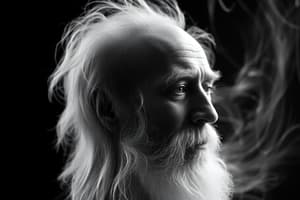Podcast
Questions and Answers
What is the main purpose of the persona according to Jung?
What is the main purpose of the persona according to Jung?
- To embrace our dark qualities
- To show our public face to the world (correct)
- To express our deepest desires openly
- To hide our true self from society
Which archetype represents the qualities we try to hide from ourselves and others?
Which archetype represents the qualities we try to hide from ourselves and others?
- Anima
- Persona
- Self
- Shadow (correct)
What is the challenge associated with becoming acquainted with the anima for men?
What is the challenge associated with becoming acquainted with the anima for men?
- It requires looking within and embracing femininity (correct)
- It is a simple and quick process
- It does not require courage
- It involves suppressing emotions and desires
According to Jung, what happens if we identify too closely with our persona?
According to Jung, what happens if we identify too closely with our persona?
Which archetype represents the feminine side in men, the woman within themselves?
Which archetype represents the feminine side in men, the woman within themselves?
What are archetypes according to Carl Jung?
What are archetypes according to Carl Jung?
How are archetypes expressed in human expression according to Jung?
How are archetypes expressed in human expression according to Jung?
Explain the role of archetypes in shaping individuals according to Jung.
Explain the role of archetypes in shaping individuals according to Jung.
How can gaining insight into archetypes help individuals?
How can gaining insight into archetypes help individuals?
What is the concept of collective unconscious in Jungian psychology?
What is the concept of collective unconscious in Jungian psychology?
How do archetypes relate to mythology, art, literature, and religion?
How do archetypes relate to mythology, art, literature, and religion?
What is the significance of symbols in expressing archetypes?
What is the significance of symbols in expressing archetypes?
Explain the connection between archetypes and dreams.
Explain the connection between archetypes and dreams.
How does Jung suggest integrating archetypes into conscious awareness?
How does Jung suggest integrating archetypes into conscious awareness?
What is the relationship between archetypes and the human psyche according to Jung?
What is the relationship between archetypes and the human psyche according to Jung?
Study Notes
Anima and Animus
- The anima is the feminine side of men, originating from their experiences with women, such as mothers, sisters, and lovers.
- It represents irrational moods and feelings in men.
- The animus is the masculine side of women, responsible for thinking and reasoning, and produces opinions in women.
Archetypes
- The Great Mother is a derivative of the anima, present in both men and women, symbolizing fertility, nourishment, power, and destruction.
- The Wise Old Man represents wisdom and meaning, symbolizing life itself.
- The Hero is a person who conquers an evil foe but has a tragic flaw, symbolizing the human desire to overcome adversity.
Self
- The Self is the archetype of archetypes, unifying the other archetypes in the process of self-realization.
Personal Unconscious
- Contains repressed, forgotten, or subliminally perceived experiences, including infantile memories and impulses.
- Unique to each individual, it is similar to Freud's unconscious.
- Complexes are emotionally toned conglomeration of associated ideas, organized around a common theme.
Mother Complex
- A person's experiences with their mother can become grouped around an emotional core, sparking an emotional response that blocks thought.
Collective Unconscious
- Has roots in the ancestral experiences of the entire species, transmitted through generations.
- Includes universal concepts such as God, mother, water, earth, and more.
- Archetypes are highly developed elements of the collective unconscious.
Levels of the Psyche
- Conscious: sensed by the ego, whereas unconscious elements have no relationship with the ego.
- Personal Unconscious: contains repressed, forgotten, or subliminally perceived experiences.
- Collective Unconscious: includes universal concepts and archetypes.
Psychological Types
- Attitude: introversion and extraversion, a predisposition to act or react in a characteristic direction.
- Functions: sensing, intuiting, thinking, and feeling.
Archetypes Continued
- Persona: the public face or side of personality that people show to the world.
- Shadow: the dark, repressed qualities we hide from ourselves and others.
Studying That Suits You
Use AI to generate personalized quizzes and flashcards to suit your learning preferences.
Description
Explore Carl Jung's concepts of anima and animus, where anima refers to the feminine side of men and animus refers to the masculine side of women. Understand how these archetypes influence emotions and reasoning according to Jungian psychology.




